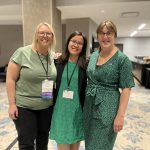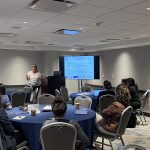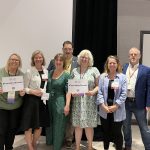Lightbulbs, Networks and Diversity – Manchester attends the Science of Team Science Conference 2023
 As part of the Team research programme (TRP), we were delighted to attend the International Network for the Science of Team Science (INSciTS) annual conference to present a workshop on the programme’s first phase and gain insight and evaluation from this international community.
As part of the Team research programme (TRP), we were delighted to attend the International Network for the Science of Team Science (INSciTS) annual conference to present a workshop on the programme’s first phase and gain insight and evaluation from this international community.
It was also fantastic to be able to fund a first time INSciTS delegate and speaker, Dr Lana Lai, Research CFHealthHub Research Associate, to develop Manchester’s Team Research capacity and capability.
Despite some considerable travel challenges, including flight delays, diversions and missing luggage, the team managed to arrive in time for all their presentations and the whole ordeal was worth every step: WHAT A CONFERENCE; WHAT A COMMUNITY!
This year’s INSciTS conference theme was Bridging Theory and Practice, bringing together a wide range of experts from different disciplines to share the latest evidence-based methods in team collaboration and transdisciplinary science.
Diversity was evident as we had participants from academia, government, industry and many other sectors from the US and Europe; each coming with their own unique expertise and experience.
Team Research Programme Activities
 Our TRP co-leads, Ruth and Charlie, led a workshop on “an interactive review and practical evaluation of a UK team research/team science training and development programme”.
Our TRP co-leads, Ruth and Charlie, led a workshop on “an interactive review and practical evaluation of a UK team research/team science training and development programme”.
The session generated a great deal of discussion, some really useful insights and feedback which Charlie and Ruth are bringing back to feed into further work. It also generated a spontaneous round of applause for our animated video! (watch the video).
Dr Lana Lai, who was supported to attend by the TRP programme funds as part of capacity building, presented her work on how the team research approach has been adopted by the CFHealthHub learning health system.
Lana described how the aim of forming a collaborative network to support people with cystic fibrosis to live as normal a life as possible is a rich case study demonstrating how a multi-disciplinary team, united by a clear aim and when equipped with the right resources, can deliver high-quality research and improvement work to improve patient care.
Our lightbulb moments
Dr. Michelle Bennett’s workshop explored the power of shared team mindset, and how the right mindset and values (i.e. transparency, accountability and compassion) are essential to develop effective teams, and how to create, strengthen and sustain effective science through a mutual learning approach. Creating safe environments for team members to ask questions and to discuss ‘undiscussable’ issues will eventually result in high quality performance, great working relationships and better individual well-being.
In his fascinating keynote address, Dr. LingFei Wu spoke about spanning boundaries and building bridges in the study of science, introducing the link between metrics and mechanisms by demonstrating how emerging metrics of science are not only complementary to existing ones, but also shed light on the hidden structure and mechanisms of science. He also talked about how the science of organisation and teams in collective innovation within an interdisciplinary initiative can greatly expand the creative potential of research.
Dr. Carla Fehr presented an insightful session on how to create a diverse, high-functioning team. In theory, diversity helps teams to be creative and rigorous. But when many teams put strategies for increasing diversity into practice, they fail to garner these benefits. She shared some useful pointers on the potential benefits of increasing team diversity, warned against ways that uninformed approaches to diversity can hurt teams, and provided strategies for ‘doing diversity’ well.
Dr. Stephen Zaccaro addressed the challenges of multi-team systems (MTS) in scientific teamwork. Science often occurs within a network of teams called a multiteam system, as illustrated in the development and production of the COVID vaccine. The presentation described features of science MTS and their unique challenges, as well as practical tools and interventions for facilitating MTS science processes and emergent states.
Networking
In addition to all the knowledge sharing, another key highlight was the many opportunities for networking. The poster sessions and coffee breaks provided rich opportunities to engage, exchange ideas, share experiences, and establish potential collaborations. The team made numerous useful connections with US and UK communities and follow-up on these is in progress. We may even see some expert visitors in Manchester!
 Reflecting and Next Steps
Reflecting and Next Steps
As the conference drew to a close, we reflected on the knowledge, insights and experiences drawn from the event in an informal and inspiring closing session, with a call to action for all participants to carry their learnings forward and implement them in their respective disciplines.
The opportunity to share our work, create new connections, and learn more theory and practise with this community was invaluable in our Team Research Programme…roll on next year!
Find out more about the programme, get involved and join our mailing list.




0 Comments